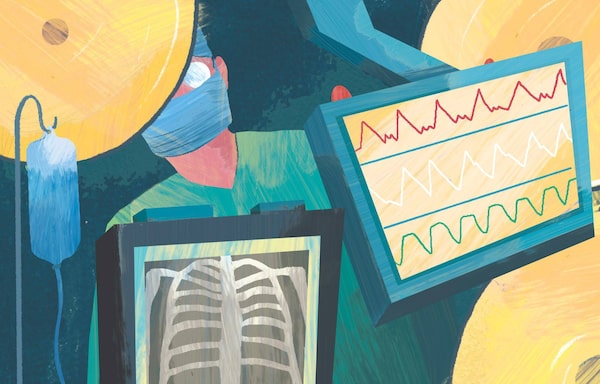
This is part of a series that looks at extraordinary experiences in personal health. Share yours at health@globeandmail.com.
It's time to breathe. Time to waken. Initiate that all-important sigh, show me the whites of those eyes, open them up to my masked face, and loud pleas.
"Time to wake up, Mrs. Mortimer, operation's all done. All is well, you're just waking up now."
Hold on, was it Mrs. Mortimer, or Milton? Something with an M, or maybe it was an N. I glance at the chart. Mitchell. Oh, right, Mrs. Mitchell.
"Time to wake up, Mrs. Mitchell!"
I stifle my own yawns, as my requests become louder and more urgent, the sleep in my eyes so blatantly evident despite my best attempts to shoo it away. Ironic that I was providing that sweet elixir of sleep, drug-induced and dreamy, to others, and yet it remained elusive and far away for me as the minutes stretched into hours and the monitors glowed more brightly as the sky darkened outside.
The surgeons book yet another case, and the big white board fills up with more ankles, and hips, brains and bowels. "What are we doing next? The crani? Oh, the bowel is going to bump the crani? It's perforated? What about the femur then?"
Nameless, faceless patients now referred to only by the pathology that brought them to our operating-room door.
"Send for the appendectomy next then, doctor? Helllooo, the appendectomy?"
The nurse's tone was short, terse, no doubt sensing my languid I-need-sleep motions.
"Is she healthy? The appendectomy?"
"I think so, surgeon didn't mention anything."
"Why hasn't he talked to me about it yet? They are supposed to call me when they are booking the case."
Annoyance crept into my voice. Was I merely someone to push the drug, insert the endotracheal tube and provide that all-so-important stillness so the surgeons could do their heroic work?
Anesthesiologists do heroic work, too, but quietly. We battle with such things that literally make the difference between life and death, or at the least between a life well-lived and a coma-induced brain starved of oxygen. We wield the weapons of pressors and inotropes, oxygen and central lines, silently battling while the surgeons curse loudly and brandish the knife as they fell the obvious demons – the bleeds and the perfs, the cancers and the masses.
Every patient knows who did that cutting. "Oh, Dr. So and So was my surgeon, she's the best …" No one remembers his or her anesthesiologist's name. "So when will I see the doctor?" they ask, after I explain, carefully and thoroughly, everything I will be doing to bring them to the brink of death and then back again. Far away are the days when I would launch into my, "Well, I am your anesthetic doctor …" speech.
So what propels me forward? Beyond the bleary-eyed nights, and being the forgotten physician; more important than the small annoyances and the pieces of dead bowel in a bucket on the operating-room floor, is the relief on my patients' faces when they wake up, unscathed and pain-free, from their propofol-induced dreams. Their comas reversed, seemingly magically, at the end of my syringe. There's the unsung gratitude of colleagues, when I turn up and smoothly transform the chaos of a badly run resuscitation into order, as only an anesthesiologist knows how.
There's the wonderment on the faces of countless mothers, as the spinal anesthetic allows them to be awake for the birth of their child, pulled so brutally and yet so beautifully, from that little cesarean incision. "It's going to be okay," I tell them, reading the expression on their faces, that heady mix of anticipation along with its unlikely bedfellow – unexpected, gut-wrenching fear.
"You're going to meet your baby and it's going to be okay. I promise." And the promise no longer feels empty, because as I absent-mindedly touch my own C-section scar through the sea-green of faded scrubs, I know now, in a way I could never have known before, that eventually, it really always is all okay.
And then sometimes, just sometimes, there's a card. The card reads, "I was scared, and waking up to your smile made it better."
Those cards are treasured and kept carefully next to the masses of cards and presents that my surgeon husband has amassed. In between the hand-knitted blankets for our son, the homemade Italian tomato sauce (because he once told a patient that his wife had not perfected her recipe yet) and the carefully crafted angel an elderly patient of his painstakingly put together, is my one card.
And sometimes I read it and it fills my heart. I am overcome with gratitude at being able to do this.
Dr. Saroo Sharda is an assistant clinical professor in the department of anaesthesiology at McMaster University in Hamilton. All opinions expressed here are her own.
Read more stories in this series here.